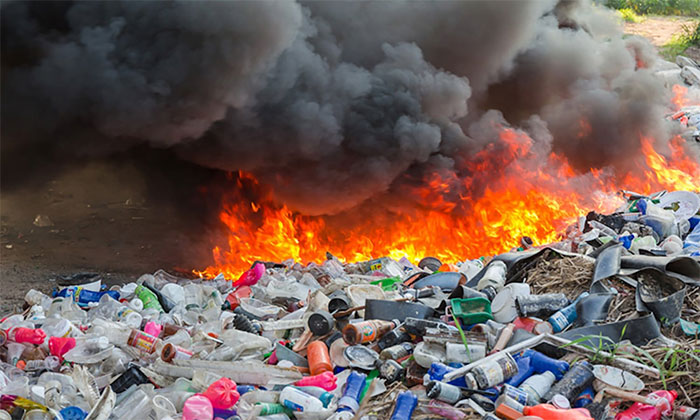Experts and young participants at a youth training workshop on the dangers of open waste burning (OWB) committed to reducing this harmful practice, which is a leading contributor to air pollution and carbon emissions in major cities across Pakistan. The Institute of Urbanism (IoU), supported by the Royal Academy of Engineering (RAE), organized the workshop titled “Let’s Learn Why Not to Burn.”
This event gathered a diverse group of experts, stakeholders, students, and members of the Prime Minister’s Youth Programme’s (PMYP) Green Youth Movement (GYM) clubs to address OWB and explore sustainable alternatives. OWB is commonly used in regions with limited waste management infrastructure, where only 60-70% of urban waste is collected, forcing communities and waste workers to resort to burning waste as a cheap disposal method.
In 2017-18, OWB contributed approximately 0.9 Mt CO2e in Pakistan. Recognizing the severe impact of OWB, the Government of Pakistan included its prevention in the National Clean Air Policy 2023 and banned the burning of municipal, agricultural, and hazardous waste. However, the implementation of these measures remains weak.
Ayesha Majid, Senior Program Coordinator at IoU, emphasized that OWB is a significant source of carbon emissions and air pollution in Pakistan, contributing to the growing smog problem in major cities. Eliminating this practice is critical for environmental and public health. Dr. Ejaz Ahmad, Senior Program Fellow at IoU, added that OWB releases toxic gases and harmful microplastics, endangering public health.
During a session on finding sustainable alternatives to OWB, Dr. Sofia Khalid, Head of Environmental Sciences at AIOU, highlighted the need for better waste management systems and increased awareness about the dangers of burning waste. Eco-organics Fertilizer Founder, Aqsa Arshad, shared her success in converting green and brown waste into compost, showing that proper waste management can be profitable.
Raza Javaid, Founder of Waste Hero, emphasized that mismanagement of waste, including OWB, is also a behavioral issue. He called for a change in how communities perceive and handle waste. Participants, including students, also shared their perspectives on raising awareness and leveraging digital platforms to curb OWB practices.
The Institute of Urbanism remains committed to raising awareness about the hazards of OWB and advocating for sustainable waste management solutions across Pakistan.
